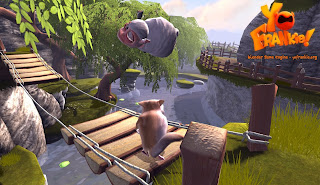The Free Game Lag
Posted: 2011-07-19
My article in the Free Software Foundation's Fall 2010 Bulletin, The Free Game Lag, was just posted online. In it, I explain why proponents of software freedom should not and need not dismiss gaming as a hopeless effort for free software. The version here includes a section on Blender's free game effort, which was not included in the FSF Bulletin due to space constraints, but you can read that version here. Printed copies of the Bulletin are sent out to FSF members twice a year. If you would like to support free software and the work of the FSF, you can learn more about membership and benefits here: http://www.fsf.org/associate/
There is one category of software that many see as being unsustainable as free software. Free video games have lagged behind other areas of free software, and the reasons behind this are fairly simple.
 |
| Nexuiz |
There is a natural tendency for free software to take on more essential aspects of computing first. While subjective, it is clear that gaming is not a top-priority and, as such, has not advanced as rapidly as say, web browsers or word processors. That isn't to say that no progress has been made. Indeed, free gaming has certainly been catching up, but it will take a while to surpass the quality of proprietary games. This should not be surprising or alarming. We will get there in good time.
 |
| Ryzom |
Through a partnership with the Free Software Foundation, Winch Gate Properties Ltd released Ryzom, the massively multiplayer online role-playing game, as free software under the AGPL, and its artwork as free cultural works under the CC-BY-SA license. As an online game, they fund development through subscriptions, so releasing as free software can only help them.
 |
| Yo Fankie! |
The possibilities don't end there, and hopefully with these examples it becomes clearer how free gaming can advance with enough interest. Free gaming will never look like the world of proprietary games today. They won't use DRM to prevent you from sharing them, and they won't limit your freedom otherwise. We can look forward to games which are not crippled by antifeatures, and are able to build upon each other to develop faster than they would have otherwise. We should in fact take it as a great sign when critical questions that were once raised against free software as whole are now just pinned on one subset of software. Now, next time anyone asks, we should have a good answer for them.